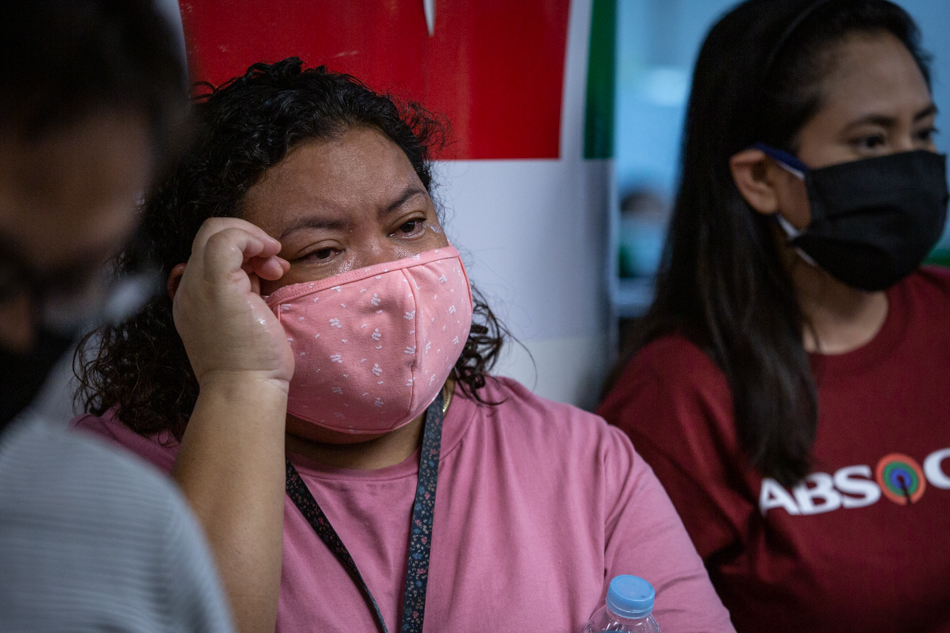Two weeks ago on May 5, the Philippines’ leading TV network ABS-CBN was ordered by the government’s telecommunications agency to cease operations, sparking outcry both in the country and across the world.
The National Telecommunications Commission (NTC) filed an immediate ‘cease and desist’ order after the network’s 25-year franchise licence had expired, pending an ongoing renewal hearing in congress.
The broadcaster’s news channel, however, is one of the few branches of ABS-CBN allowed to continue operating and Ging Reyes, Head of Integrated News and Current Affairs, painted a picture of a newsroom that is emboldened.
“Our team is still working as hard as possible, we’re all running on adrenaline,” said Reyes. “I can see it across the team, this renewed energy and never say die spirit.”
But on May 19, two decisions further compounded the uncertainty surrounding the fate of the broadcaster.
The first came in the Supreme Court, where the judges chose to defer on a plea from ABS-CBN to resume operations immediately, in what the broadcaster said would help prevent “irreparable injury”.
The court voted unanimously to give the NTC, as well as both chambers of Congress, the chance to comment within 10 days, and another five days for ABS-CBN to give additional response, further obscuring the immediate future of the broadcaster.
There was further confusion in the House of Representatives the day before on May 18. In what had looked like a formality to pass, House Bill 6732, granting ABS-CBN a temporary franchise agreement, was unexpectedly recalled by the House on the 2nd reading approval with consitionallity issues cited.
While the bill would have had to pass the Senate before being signed off by the president, it would have allowed ABS-CBN to immediately resume operations on a temporary basis until October 31.
On May 19, the House threw another curve ball and abandoned the bill to give ABS-CBN a temporary franchise, opting instead to immediately resume hearings on granting the broadcaster a new 25-year franchise. This, however, will see ABS-CBN remain off-air while potentially lengthy deliberations take place.

Edcel Lagman, member of the House for the province of Albay, said that the bill to grant a temporary franchise had “stalled like a misdirected locomotive”, before being abandoned all together. He said that the abandonment will “gravely compound the inordinate delay in the renewal of ABS-CBN’s franchise.”
ABS-CBN’s president and CEO, Carlo Katigbak, said that it may have to start retrenchment processes, including letting workers go, by August if it is not allowed to resume normal operations soon.
In a country ruled under what many observers regard as an increasingly autocratic leader, who has repeatedly reiterated threats to block the renewal of the network’s licence, the ultimate fate of ABS-CBN’s is still shrouded in uncertainty.
However, while the highly popular free-to-air broadcasting content has been pulled, some subsidiaries of the network were not affected by the cease and desist order and continue to operate, albeit in a very different environment than before.
The network continues to produce content on its popular online and streaming platforms, while the ABS-CBN News Channel (ANC) can continue broadcasting as the NTC order does not cover cable news channels. TV Patrol, the broadcaster’s flagship news programme, has now also returned via streaming.

With some shows still running and a fight in the courts to return to the air, ABS-CBN is not leaving silently. In an interview with the Globe, Reyes said that the newsroom staff at ANC are working as hard as before, even during an unprecedented period for the network.
“You want to prove something, you want to prove that we are never going to be silent,” Reyes explained. “We are continuing the work that we do because it is an important service for our fellow Filipinos.”
Reyes, however, admitted that the network’s reach has been curtailed. Even though online and streaming platforms are significant, it requires strong broadband or enough data to access it – which isn’t always available across the vast Philippines archipelago.
“It’s just not enough, as people need strong internet access in all parts of the country to use these platforms,” Reyes admitted. “Ultimately, it’s the public who also lose out.”
While the events of May 5 came as a shock to outside observers, there was a sense of impending dread within the newsroom that being taken off air was a serious possibility. But it was still a hard moment for Reyes and her colleagues, however well they had prepared.

We’re very grateful for the support we’ve been getting, and I believe that good will prevail – I still have faith in our democratic systems
Ging Reyes, ABS-CBN’s Head of Integrated News and Current Affairs
“We had this sense of dread – but we carried on with our work, of course,” she remembered.
On May 5, the day of the cease and desist order, Reyes said that everyone was on alert, checking with sources to see if word had escaped from the NTA. A member of the editorial team first received news from a source that the NTA was to decide unfavourably on the ABS issue.
“We still hadn’t got confirmation when another reporter got in touch and said, ‘I wish that I had better news – the cease and desist is on its way,’” she recalled.
Reyes said that the shock within the newsroom could be seen through masks, being worn in the office because of Covid-19.
“You know that feeling when you plan for something, but you still don’t believe that it will actually happen,” Reyes asked. “But when it does, you have to muster all your energy and courage and deal with it in the right way – but at the same time, you are in shock.”
Shock had to be channelled into grit as the newsroom started breaking news about their own network. “You know that journalists are averse to doing stories on themselves,” said Reyes. “But we knew that this was a huge story and had to be covered in full. Because it wasn’t just about us, it was also about our millions of viewers and listeners.”
Two weeks since the closure, the newsroom at ABS-CBN continues to provide coverage, vital during the continuing pandemic and lockdown in the Philippines. And while their resources are now stretched, Reyes and colleagues continue working as if nothing has changed – so when Typhoon Ambo hit the country early on May 15, ANC reporters were on the scene filling stories.
“We’re very grateful for the support we’ve been getting, and I believe that good will prevail – I still have faith in our democratic systems,” said Reyes. And driven by the ethos of the organisation, The Kapamilya Way (kapamilya meaning ‘family’ in Tagalog), the newsroom is continuing to work for the people it attempts to serve.
“These are of course unprecedented times. But we are not giving up on our commitment to be of service.”


